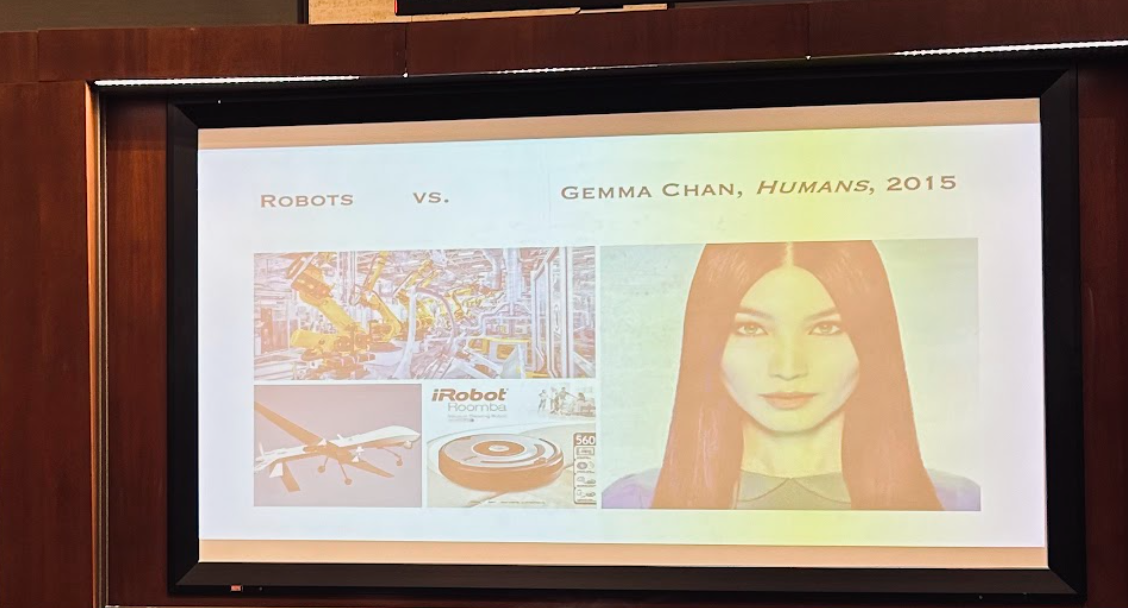Professor and author Leslie Bow spoke about the fetishism of Asian women across media, humanoid robots, and large AI language models at Saieh Hall on February 1. Bow’s lecture was co-sponsored by the Department of Comparative Literature.
Bow, a fourth-generation Chinese American, is a professor of English and Asian American studies at the University of Wisconsin–Madison. Most recently credited for penning Racist Love: Asian Abstraction and the Pleasures of Fantasy, Bow described Western infatuation with Asian cultures as stifling, exploitative, and paradoxical during the talk.
She raised examples of “Asianized objects” being sexualized in the media as visual evidence of dangerous stereotypes. For instance, Bow cited Okuni, the Japanese geisha vehicle from Cars 2, as an example of a caricature in a cartoon that exhibits such stereotypes.
“So how do we create a Japanese car? One of the most obvious ways is a tight Toyota. But, instead of doing that, they add all of these ethnic signifiers on this inanimate object to make it gendered and Japanese,” Bow said.
Okumi’s presence is not only out of place within the movie, but, according to Bow, demonstrative of the gross and obvious fantasies attached to race. With her cute, “kawaii” aesthetic, a stereotypical “Japaneseness and racialization is grafted onto a non-human form.”
Bow said Asian androids with strong human likenesses represent a continued form of desire and replicate the attributes of submissiveness and docility attached to Asian women. These androids are social robots, a subset of robots whose purpose lies in communication and social interaction. Thus, they are created to be visually pleasing to humans in order to create a form of intimacy and relationship.
However, this “racialization” of autonomous robots also invokes feelings of control. A 2008 video played at the event showed curious teenage Japanese boys surrounding Aiko, an android resembling an Asian woman, freely touching it and testing its sensitivity regardless of its response. As Bow showed, perverse, specifically Asian depictions of robots exist in U.S. culture as well, with examples including Gemma Chan’s portrayal of an anthropomorphic robot in the series Humans. The internal link of subservient robots to Asian women only worsens the global perception of Asian women and topics of consent.
The heaviness of Bow’s discourse, which includes themes of sexual violence, sexual abuse, and consent, led the professor to temporarily stop speaking on panels about Asian-American caricatures. “There’s a kind of absurdity about the topic because I’m talking about cars and latex-covered skeleton robots, but the actual topic is very traumatic and triggering because of sexual violence or sexual abuse,” Bow said.
However, the gravity of Bow’s work brought some positive attention. She explained that she received an outpouring of emails about the chapter “Asian • Female • Robot • Slave: Techno-Orientalism after #MeToo” in Racist Love, which bridges the intersectional stereotypes of Asian women.
“Young Asian women were identifying with that particular chapter,” Bow said. “Young people are trying to figure out their sexuality and the ways that race fits into that in the United States.”
When considering the thesis of Bow’s talk, depictions and cultural reinforcement of a gendered and “cute” Asian aesthetic are dangerous when robots and artificial intelligence are created for human use. “When you start making robots in the form of sexy Asian women, there’s another kind of affective or emotional relationship because it invokes the idea of domination,” she said.









